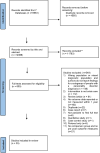Crisis and acute mental health care for people who have been given a diagnosis of a 'personality disorder': a systematic review
- PMID: 37798701
- PMCID: PMC10552436
- DOI: 10.1186/s12888-023-05119-7
Crisis and acute mental health care for people who have been given a diagnosis of a 'personality disorder': a systematic review
Abstract
Background: People who have been given a diagnosis of a 'personality disorder' need access to good quality mental healthcare when in crisis, but the evidence underpinning crisis services for this group is limited. We synthesised quantitative studies reporting outcomes for people with a 'personality disorder' diagnosis using crisis and acute mental health services.
Methods: We searched OVID Medline, PsycInfo, PsycExtra, Web of Science, HMIC, CINAHL Plus, Clinical Trials and Cochrane CENTRAL for randomised controlled trials (RCTs) and observational studies that reported at least one clinical or social outcome following use of crisis and acute care for people given a 'personality disorder' diagnosis. We performed a narrative synthesis of evidence for each model of care found.
Results: We screened 16,953 records resulting in 35 studies included in the review. Studies were published between 1987-2022 and conducted in 13 countries. Six studies were RCTs, the remainder were non randomised controlled studies or cohort studies reporting change over time. Studies were found reporting outcomes for crisis teams, acute hospital admission, acute day units, brief admission, crisis-focused psychotherapies in a number of settings, Mother and Baby units, an early intervention service and joint crisis planning. The evidence for all models of care except brief admission and outpatient-based psychotherapies was assessed as low or very low certainty.
Conclusion: The literature found was sparse and of low quality. There were no high-quality studies that investigated outcomes following use of crisis team or hospital admission for this group. Studies investigating crisis-focused psychological interventions showed potentially promising results.
Keywords: Complex emotional needs; Crisis care; Home treatment; Inpatient admission; Personality disorder.
© 2023. BioMed Central Ltd., part of Springer Nature.
Conflict of interest statement
The authors declare no competing interests.
Figures
References
-
- National Institute for Mental Health for England. Personality Disorder: no Longer a Diagnosis of Exclusion. Policy Implementation Guidance for the Development of Services for People with Personality Disorder, Gateway Reference 1055. London: NIMH(E); 2003.
-
- Newbigging K, Rees J, Ince R, Mohan J, Joseph D, Ashman M, et al. The contribution of the voluntary sector to mental health crisis care: a mixed-methods study. NIHR Journals Library. 2020. - PubMed
-
- Kealy D, Ogrodniczuk JS. Marginalization of borderline personality disorder. J Psychiatr Pract. 2010;16(3):145–154. - PubMed
Publication types
MeSH terms
Grants and funding
LinkOut - more resources
Full Text Sources
Medical




